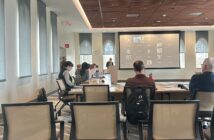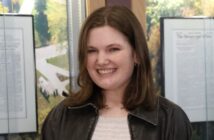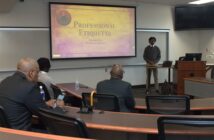Lehigh’s Marcon Institute hosted its third annual Radical Love Conference between Friday and Tuesday. Each day of the conference, the institute hosted events for the Lehigh and Bethlehem communities, all centered on understanding the power of love.
The conference seeks to challenge traditional notions of love as an abstract feeling and instead engage with it as a tool for social change. It is inspired by the author bell hooks, also known as Gloria Jean Watkins, and her concepts of love, according to the institute’s website.
Ruha Benjamin, an Alexander Stewart 1886 professor of African American studies at Princeton University and a MacArthur Genius Fellow, was the designated keynote speaker for the conference.
A scholar in the fields of race, technology and social justice, Benjamin held a luncheon with the Marcon Fellows before delivering her keynote address at the conference on Friday. Her lecture was titled “Dystopia Utopia or UStopia?: From Artificial Intelligence to Abundant Imagination.”
The luncheon provided a setting for students to ask questions, share their own experiences and discuss the personal implications of Benjamin’s work.
Emely Castrejon, ‘25, attended the luncheon and said she appreciated the space for deep reflection on love, justice and religion.
“I enjoyed the luncheon, because it allowed me to relate beyond the lecture and personally engage with Benjamin’s ideas through the perspective of my Catholic faith,” Castrejon said.
She also said she has been incorporating Benjamin’s ideas into her life and activism.
The keynote event, open to all students and faculty, explored the theme of embodied love and its societal impact on technology. Benjamin’s lecture provided insights into how love can serve as a radical force for transformation in the fight against oppression.
In an interview with The Brown and White before her speech, Benjamin said events like the conference are an extension of teaching beyond the traditional classroom setting.
“Often, we think of teaching as limited to students who enroll in our classes, but I see the classroom as much more expansive,” Benjamin said.
She emphasized the importance of popular education. She also said learning happens in many different settings and isn’t limited to those with academic credentials.
“We can learn from community organizers, from our elders, from our families, not just people with fancy titles are teachers.” Benjamin said. “Something I really value is being able to be both a student and a teacher in different settings.”
In her lecture, Benjamin explored how dystopian realities shaped by white supremacy, capitalism and colonialism are not inevitable, but the result of human choices and imagination. She explained that the same imagination used to uphold oppression can also be used to envision and build just futures.
She also drew upon her work, which critically examines how technology exacerbates social inequalities and engages with grassroots approaches to viral justice — the way in which justice initiatives spread on a wider scale.
Benjamin also highlighted how reimagining the world requires breaking free from rigid structures of knowledge and authority.
“If we can imagine systems of harm, we can also imagine systems of care,” she said in her lecture.
She then asked the audience to consider how technology and policy could be reshaped to foster justice rather than reinforce oppression.
Many students who were in attendance stayed for a post-lecture discussion.
Huda Hagos, ‘26G, said the theme of embodied love this year is “perfect.”
“We often think of love as something personal or a feeling, but this conference challenges us to think about how love can manifest to our communities and systems of power,” Hagos said.
She said the talk also encouraged her to think critically about the world and imagine ways to foster a society where everyone can thrive.
Tasfia Ahmad, ‘27, said the Radical Love Conference allows students to explore the ideas of love and justice as forces for meaningful change.
“Her lecture made it clear that love is not just about personal relationships,” Ahmad said. “It’s about collective action and a powerful tool in fighting for justice.”
Benjamin emphasized the importance of local community engagement in bridging academic discussion with real-world action to build movement to challenge structural oppression.
“The work that happens in communities on the ground is just as important as the academic work we do in universities,” she said.
Braylon Ware, ‘27, reflected on Benjamin’s emphasis of self-reflection and challenging complacency, particularly in the Black community.
“She challenged us to think deeply about whether we are truly living up to being our ancestors’ wildest dreams and whether our descendants would see us in the same light,” Ware said. “This really struck a chord with me, as it speaks to the comfort that can sometimes creep into our communities and hinder progress.”
He also said the Radical Love Conference embodies this concept by bringing people together from diverse backgrounds to contribute to the conversation and work ahead.
In her closing remarks, Benjamin drew a parallel between community engagement and the collaborative nature of bees.
“Bees remind us that collaboration is how we survive, that decisions should be made collectively and that we each have a part to play in creating livable ecosystems,” she said. “But, most important of all, bees are visionary. They respond to the ultraviolet reflection of flowers.”
She encouraged the audience to adopt a similar visionary perspective, particularly in the face of global challenges.






Comment policy
Comments posted to The Brown and White website are reviewed by a moderator before being approved. Incendiary speech or harassing language, including comments targeted at individuals, may be deemed unacceptable and not published. Spam and other soliciting will also be declined.
The Brown and White also reserves the right to not publish entirely anonymous comments.
1 Comment
FWIW the featured speaker recently said in a podcast that desegregation of American schools was a big mistake. When challenged by the host, she confirmed that her opinion was not mis-heard. In her view it was a mistake to try to integrate the population to an irredeemably-racist nation. You can look it up.